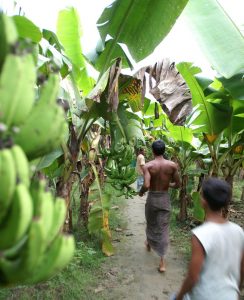New challenges for commodity certification
At the recent conference of the ISEAL Alliance in Zurich, I was invited to join a panel discussion on the effectiveness of standards and certification for reinforcing tropical supply chains. Based on a wide range of serious impact studies and other evidence, the general insight that commodity certification provides some important albeit rather modest benefits to smallholder farmers was confirmed. But more importantly, some new issues are emerging that may trigger certification organizations towards a more forward-looking update of their practices.
We outline the four key challenges:
- Certification becomes more valuable once it supports access to finance
- For many perennial crops, certification needs to enhance tree renovation
- With climate change, certification needs to consider shifting production frontiers
- Certification for quality needs to address value added distribution in supply chain
#1 Commodity certification becomes more valuable once it supports access to finance
Few commodity certification schemes involve pre-finance as a requisite for recognition. Pre-finance enables primary producers (of coffee, tea, cocoa and cotton) to escape from local traders that commit their harvest early in the season (when it is still in the field) at very low prices. Poor smallholder producers need cash resources to purchase inputs and pay for wage labour. Therefore, access to formal credit is of fundamental importance. It would be a big step forward if certification can be recognized as a sound collateral for borrowing. This also requires the industry to engage into more contractual arrangements with producers in order to reduce risks and enhance their delivery certainty.
#2 For many perennial crops, certification needs to enhance tree renovation
 Several certified commodities are perennial crops that need periodical renovation. Uncertainties regarding market outlets and unclear land tenure rights tend to inhibit this renovation process. Consequently, tree productivity is decreasing and farmers consider the activity less attractive. Engagement in tree renovation requires an enhanced time horizon as well as access to financial resources (i.e. long-term credit) that enable farmers to overcome temporary income shortfalls while switching towards newer trees.
Several certified commodities are perennial crops that need periodical renovation. Uncertainties regarding market outlets and unclear land tenure rights tend to inhibit this renovation process. Consequently, tree productivity is decreasing and farmers consider the activity less attractive. Engagement in tree renovation requires an enhanced time horizon as well as access to financial resources (i.e. long-term credit) that enable farmers to overcome temporary income shortfalls while switching towards newer trees.
#3 With climate change, certification needs to consider shifting production frontiers
Tree renovation should be done with great care, since the cultivation frontier for several tree crops is changing due to climate change. Changes in rainfall and temperature push coffee production to uphill areas in Central America with a velocity of 100 meter every 25 years. This implies that some older coffee areas become less viable, and that new trees are better planted in highland zones. This might contradict, however, environmental conservation strategies that are designed for these areas.
#4 Certification for quality needs to address value added distribution in supply chain
Many B2B certification schemes focus mostly on quality improvement and access to premium markets. This is indeed a profitable strategy that deserves due attention. Smallholder farmers are willing to engage in quality upgrading, but still receive little incentives to do so. The farmers share in total value added of certified products has hardly changed. It is time that certification organizations also make a plea for a large share of the end price that accrues to the farmers.

